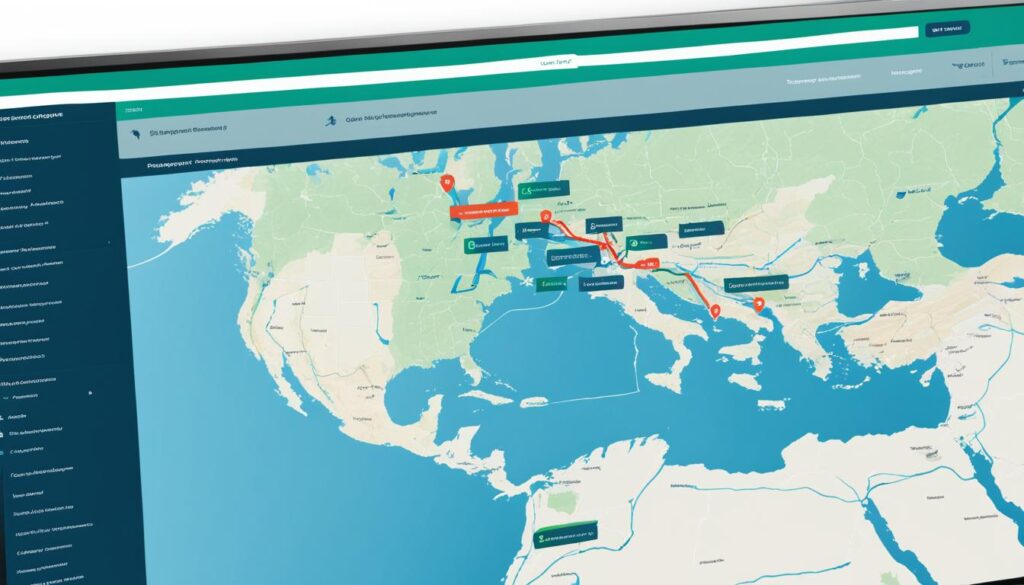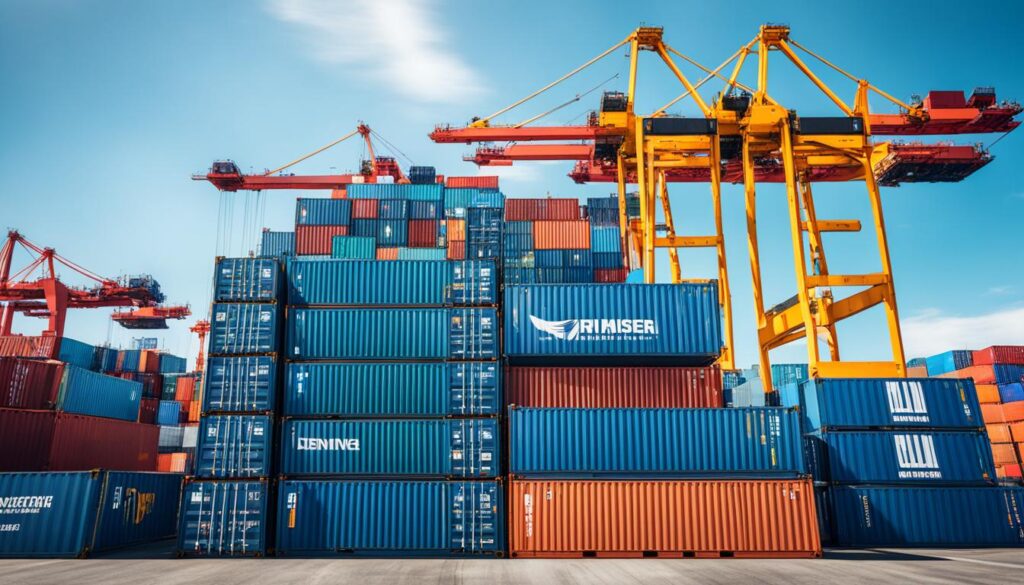As businesses expand beyond their borders and engage in global trade, international shipping becomes a crucial aspect to consider. As such, it is imperative for businesses to adopt streamlined shipping processes that effectively manage international logistics. With the advent of logistics technology, the journey towards efficiency has been made smooth.
International shipping tools are essential for businesses to maintain a competitive edge in the global market. These tools not only aid in solving various logistical challenges but also provide ease of shipping to different locations all around the world.
In this comprehensive guide, we will dive deep into the world of logistics technology, exploring various international shipping tools, including global shipping tools, logistics technology, and shipping software solutions that cater to efficient shipping and the optimization of freight management.
Key Takeaways
- International shipping tools are essential for businesses engaged in global trade
- Logistics technology offers a range of tools and solutions to streamline global trade operations
- Freight management software optimizes shipping processes through load optimization and real-time tracking
- Online shipping tools leverage convenience for businesses engaged in international trade
- Shipping platforms offer an all-in-one solution for managing international shipping operations
Understanding the Need for International Shipping Tools
Global trade has its unique challenges, and one of them is international shipping. Unlike domestic shipping, there are various factors to consider when shipping goods overseas, such as customs regulations, language barriers, and complex transportation networks. These complexities can lead to significant delays, increased costs, and unsatisfied customers.
Unlocking the potential of international trade requires leveraging robust tools that can simplify the shipping process. International shipping tools provide businesses with the necessary resources to manage their operations efficiently and effectively.
By incorporating the right global trade tools, businesses can experience several benefits, including enhanced visibility, faster transit times, and streamlined processes. These benefits are critical for enabling businesses to remain competitive in today’s interconnected global economy.
Through using tools such as shipping software, logistics technology, and freight management solutions, businesses can reduce the complexity of international shipping and achieve higher levels of success.
The right international shipping tools allow businesses to manage complex global logistics with ease.
Shipping Software Solutions for Seamless Logistics
International shipping can be a complex process, but shipping software solutions can help streamline your logistics operations. By automating different processes and providing real-time tracking, shipping software can enhance your global trade management and optimize freight management.
Features of Shipping Software
Shipping software solutions offer a range of features that can boost your logistics operations. Here are some of the most beneficial features:
- Automated processes: Shipping software can automate repetitive tasks, such as label printing, customs documentation, and bill of lading generation, saving you time and reducing errors.
- Tracking and visibility: Real-time tracking provides visibility into the status of shipments, allowing you to identify and address problems quickly.
- Freight management optimization: Shipping software can help optimize freight management, from load optimization to carrier selection, reducing shipping costs and enhancing efficiency.
- Carrier integration: Many shipping software solutions provide seamless carrier integration, allowing you to manage different carriers from a single platform.
Benefits of Shipping Software
By utilizing shipping software solutions, you can enjoy a range of benefits, including:
- Increased efficiency: Shipping software can automate tasks and offer a single platform for managing different aspects of logistics, enhancing efficiency and reducing the risk of errors.
- Real-time tracking and communication: With real-time tracking and communication, you can respond quickly to changes, reducing the risk of lost or delayed shipments.
- Enhanced customer satisfaction: Real-time tracking and digital documentation increase the transparency of the shipping process, improving customer satisfaction and reducing inquiries.
- Better cost management: Shipping software can help you identify cost-saving opportunities, such as carrier selection or optimization of lead times.
By leveraging shipping software solutions, businesses can achieve seamless logistics and optimize their global trade management.
Streamlining Global Trade with Logistics Technology
International trade requires extensive coordination, and logistics technology provides the necessary tools for efficient and streamlined operations. By using technology such as supply chain management systems, warehouse management systems, and transportation management systems, businesses can improve their international logistics processes. Here are some of the key benefits:
| Logistics Technology | Benefits |
|---|---|
| Supply Chain Management Systems | Real-time tracking of goods, inventory management, cost optimization |
| Warehouse Management Systems | Efficient storage management, inventory control, order tracking |
| Transportation Management Systems | Carrier selection, route optimization, cost management |
By leveraging logistics technology, businesses can gain a competitive edge and improve their bottom line. With real-time tracking, inventory control, and cost optimization, businesses can enhance their international logistics solutions in a way that saves time and resources.
Logistics technology has become an integral part of modern logistics management, and with the right tools, businesses can streamline their operations and improve their global trade management. In the next section, we’ll discuss the benefits of freight management software.
Enhancing Freight Management with Dedicated Tools
Efficient freight management is vital for any business involved in international shipping. Leveraging the right tools can optimize your shipping processes, including load optimization, carrier selection, and real-time tracking. Freight management software is a dedicated tool that can significantly streamline your shipping operations. This powerful software allows shippers to easily track and manage their freight, ensuring maximum efficiency and cost savings.
Frequent challenges in international shipping, such as managing multiple carriers, determining the most cost-effective shipping method, and handling customs clearance, can be time-consuming and difficult to navigate. Dedicated freight management software provides solutions to these challenges, automating many processes and greatly improving efficiency.

Load Optimization
Load optimization is a key feature of freight management software that allows shippers to maximize the potential of their transportation equipment. By optimizing loads, shippers can reduce costs associated with unused space or overweight shipments. This feature also supports scheduling pickups or deliveries and ensures each truck is carrying the optimal amount of freight.
Carrier Selection
Freight management software provides access to a broad network of carriers, enabling shippers to select the best carrier for each shipment. Through integrated carrier management, shippers can compare prices and delivery times and select a carrier based on their customized needs. This feature ensures accurate reporting and effective carrier performance management.
Real-Time Tracking
Freight management software offers real-time tracking, providing shippers with visibility into their shipment status at every stage of the transportation process. This feature allows businesses to monitor the progress of their shipments and communicate expected delivery times to customers. With a real-time tracking system, shippers can also proactively respond to any potential delays or disruptions in the shipping process.
In conclusion, dedicated freight management software is an essential tool for businesses involved in international shipping. Streamlining your shipping operations using freight management software can optimize your processes while saving time and reducing costs.
Shipment Tracking Tools for Visibility and Customer Satisfaction
Shipment tracking tools are essential components of any international shipping operation. They offer real-time visibility into the movement of goods, ensuring that businesses and customers are always up-to-date on the status of their shipments. These tools provide valuable insights into the supply chain, allowing companies to identify potential issues and address them before they cause delays or disruptions.
Online shipping tools have made tracking shipments easier than ever before. With just a few clicks or taps, customers can access real-time updates on their shipments, including expected delivery dates and any delays or issues that may arise. This level of transparency builds trust and confidence in the shipping process, leading to greater customer satisfaction and loyalty.
Logistics technology has made it possible to integrate shipment tracking tools into broader logistics management systems. By combining shipping data with other key metrics, businesses can gain a deeper understanding of their operations and identify opportunities for optimization and improvement. This can include everything from optimizing delivery routes to identifying cost-saving measures.
The Benefits of Shipment Tracking Tools
By leveraging shipment tracking tools, businesses can improve the efficiency and effectiveness of their shipping processes in several ways:
- Real-time shipment updates ensure that businesses and customers are always informed of the status of their shipments, leading to greater peace of mind and customer satisfaction.
- Tracking tools allow businesses to identify potential issues or delays in the supply chain and take proactive measures to address them before they become major problems.
- Integration with logistics technology systems provides businesses with a comprehensive view of their operations, including shipment data, cost metrics, and performance analytics.
The bottom line is that shipment tracking tools are essential components of any successful international shipping operation. They provide valuable insights into the supply chain, improve customer satisfaction, and optimize logistics processes for greater efficiency and cost savings.
Leveraging Online Shipping Tools for Convenience
When it comes to international trade, efficiency is key. That’s where online shipping tools come in, providing convenience and streamlining your logistics processes. With just a few clicks, you can manage your shipments, monitor delivery, and generate shipping labels.
These tools provide a range of digital solutions that help simplify and expedite the shipping process. One popular option is online freight calculators, which help you determine the costs of shipping. By inputting the weight and dimensions of your shipment, these calculators can generate various shipping rates from multiple carriers, allowing you to compare and choose the most cost-effective option.
Another useful online tool is document management software, which allows you to create, manage, and send shipping documents electronically. No more printing and mailing, saving you time, money, and reducing your carbon footprint.
By leveraging these online shipping tools, you can automate your shipping processes, simplify paperwork, and expedite delivery. The result is a streamlined system that saves you time and money, allowing you to focus on what matters most – growing your business.
Benefits of Online Shipping Tools:
| Benefits | Description |
|---|---|
| Convenience | Easily manage shipments from your computer or mobile device. |
| Time Savings | No need to manually calculate rates or fill out shipping documents. |
| Cost Savings | Compare rates from multiple carriers to choose the most cost-effective option. |
| Increased Efficiency | Automate and streamline your shipping process for faster delivery. |
Harnessing the Power of Shipping Platforms
Shipping platforms are rapidly growing in popularity, offering businesses an all-in-one solution for managing international shipping operations. Utilizing a shipping platform provides businesses with a plethora of benefits, including streamlined workflows, centralized data management, and seamless integration with carriers. With a shipping platform, you can easily manage your inventory, create labels, handle returns, and communicate with carriers, all from one centralized location.
A key benefit of using a shipping platform is the ability to compare rates and delivery times from multiple carriers, allowing you to choose the best option for your business needs. This not only saves you time but can also lead to significant cost savings. Additionally, a shipping platform can automate many aspects of the shipping process, including printing labels and customs forms, further reducing the time and effort required to manage your logistics.
By using a shipping platform, businesses can take advantage of powerful logistics technology without having to invest in expensive hardware or software. The platform manages updates and maintenance, making it a hassle-free solution for businesses of all sizes.
If you’re looking to optimize your international shipping operations, a shipping platform is an excellent choice.
Comparing Shipping Platforms
| Shipping Platform | Features | Cost | Supported Carriers |
|---|---|---|---|
| ShipStation | Multi-carrier shipping, automation rules, inventory management | Starts at $9/month | USPS, UPS, FedEx, DHL, and many more |
| EasyPost | API integration, address verification, rate shopping | Pay-as-you-go pricing | 150+ carriers, including USPS, UPS, FedEx, and DHL |
| Shippo | Multi-carrier shipping, tracking, returns management | Scale with your business – custom pricing | 50+ carriers, including USPS, UPS, FedEx, and DHL |
Best Practices for Effective Utilization of International Shipping Tools
International shipping tools, such as logistics technology and global shipping tools, provide businesses with valuable resources for optimizing their shipping processes. To ensure you are getting the most out of these tools, it’s important to follow best practices. Below are some practical tips and strategies for effectively utilizing international shipping tools:
1. Analyze Your Data
Analyze your shipping data to identify areas for improvement and track your progress over time. Use shipping software to generate reports on shipping volume, carrier performance, and overall costs. This information will help you optimize your shipping operations and make data-driven decisions.
2. Optimize Your Performance
Set performance metrics for your shipping operations, such as on-time delivery rates and order accuracy. Use shipping software to monitor your performance and identify areas for improvement. Implement processes to address any issues and continually strive for better performance.
3. Emphasize Customer Satisfaction
Use shipment tracking tools to provide customers with real-time visibility into their orders. Set clear expectations for shipping times and provide proactive communication about any delays. Customer satisfaction is crucial for building customer loyalty and repeat business.
4. Stay Up-to-Date on Industry Trends
Stay informed about new shipping technology and trends in the industry. Attend conferences and trade shows, read industry publications, and engage with other professionals in the logistics and shipping industry. Being up-to-date on the latest trends will help you stay competitive and identify new opportunities for growth.
5. Leverage Automation
Use shipping software and automation tools to streamline your shipping processes, reduce errors, and save time. Automating routine tasks, such as label printing and carrier selection, will free up time for more strategic tasks, such as data analysis and optimization.
Interested in learning more about international shipping tools and logistics technology?
Check out our other sections on shipping software, logistics technology, and global shipping tools for comprehensive guides and resources.
Conclusion
International shipping tools are crucial for businesses navigating the complexities of global trade. By utilizing shipping software, logistics technology, and other tools mentioned in this guide, you can optimize your shipping processes, enhance customer satisfaction, and boost operational efficiency.
Remember to follow best practices when utilizing these tools to ensure maximum effectiveness. Analyze data regularly, optimize performance, and stay up-to-date with the latest trends in logistics technology to stay ahead of the competition.
Investing in the right international shipping tools is an investment in the future of your business. Take the necessary steps today to streamline logistics processes and enhance your global trade management.
Learn more about Amazon FBA
FAQ
Why are international shipping tools necessary for businesses engaged in global trade?
International shipping tools are necessary for businesses engaged in global trade to overcome the challenges of managing complex logistics processes across different countries and regions. These tools help streamline shipping operations, enhance visibility, and optimize freight management, ultimately leading to better operational efficiency and customer satisfaction.
What features and benefits does shipping software offer?
Shipping software offers a range of features and benefits for businesses. It automates shipping processes, including order processing, label generation, and documentation. It also provides real-time tracking of shipments, enabling businesses and customers to monitor the progress of deliveries. Shipping software integrates with carriers and provides rate shopping capabilities, helping businesses select the most cost-effective shipping solutions.
How does logistics technology help streamline global trade operations?
Logistics technology, such as supply chain management systems, warehouse management systems, and transportation management systems, helps businesses streamline global trade operations by providing end-to-end visibility and control over the supply chain. These tools optimize inventory management, automate order fulfillment, improve transportation planning, and ensure efficient warehouse operations.
What capabilities does freight management software offer for international shipping?
Freight management software offers various capabilities to enhance international shipping processes. It includes load optimization features that help maximize space utilization and minimize shipping costs. The software enables businesses to choose the most suitable carriers based on their requirements and track shipments in real-time. Freight management software also provides analytics and reporting functionalities, enabling businesses to monitor performance and make data-driven decisions.
How do shipment tracking tools benefit international shipping operations?
Shipment tracking tools provide real-time visibility into the movement of goods during international shipping operations. They enable businesses and customers to track the status of shipments, monitor delivery times, and anticipate any delays or issues. This enhances supply chain visibility, enables proactive customer communication, and improves overall customer satisfaction.
What are some examples of online shipping tools?
Online shipping tools encompass a wide range of digital solutions that simplify international shipping processes. Some examples include online freight calculators that help estimate shipping costs, document management systems that enable the easy creation and sharing of shipping documents, and online marketplaces that connect businesses with shipping providers and streamline the shipping process.
What benefits can be derived from using a shipping platform?
Using a shipping platform offers several benefits for businesses engaged in international shipping operations. It provides a centralized platform for managing all shipping activities, including order processing, shipment tracking, and documentation. A shipping platform integrates with multiple carriers, offering a streamlined carrier selection process. It also provides seamless data integration, enabling businesses to easily manage and track shipments, analyze shipping performance, and make informed decisions.
What are best practices for effectively utilizing international shipping tools?
To effectively utilize international shipping tools, businesses should follow some best practices. This includes regularly analyzing shipping data to identify areas for improvement, leveraging automation features to reduce manual workloads, regularly updating and maintaining shipping software and technology systems, and monitoring shipping metrics to optimize performance and cost efficiency.




